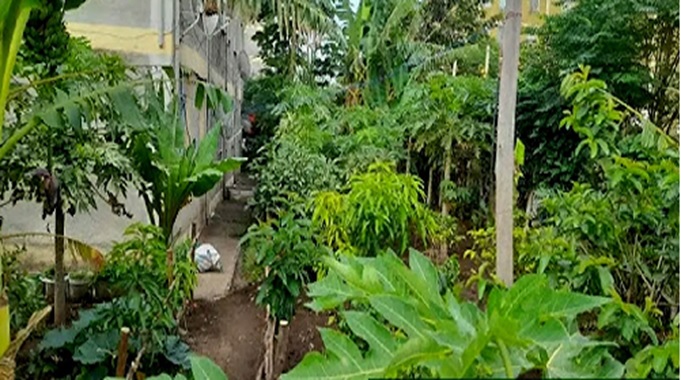
Ethiopia has long faced with food insecurity, with a significant portion of the population lacking reliable access to adequate, nutritious food. However, in recent years, the country has made strides in addressing this challenge through innovative urban agriculture initiatives. These projects have sought to leverage the untapped potential of Ethiopia’s urban centers to produce food and alleviate poverty and the burden on rural farming communities.
At the forefront of this movement are community-driven urban garden programs, which transform underutilized public spaces and private plots within cities into vibrant hubs of food production. By empowering local residents to cultivate their own fruits, vegetables, and herbs, these initiatives not only enhance household food security but also foster a sense of community and self-reliance.
Under these initiatives, the people are able to produce high yields of diverse crops within the boundaries of the city. By integrating renewable energy sources and water-efficient systems, they demonstrate the potential for sustainable, climate-smart food production in an urban setting.
Beyond cultivation, Ethiopian urban agriculture also encompasses innovative food distribution and processing models. These community-supported agriculture programs aim to bridge the gap between urban producers and consumers, ensuring that freshly harvested goods reach that in need. Meanwhile, small-scale food processing facilities enable the transformation of perishable items into shelf-stable products, reducing waste and increasing food security.
This initiative helps to end the rapid urbanization and population growth in many developing countries that have led to food insecurity and low incomes. However, the practice of urban agriculture often relies on the use of polluted water sources, which can have significant detrimental impacts on both human health and the environment.
The use of contaminated water for irrigation in urban agricultural settings can introduce a wide range of pathogens, heavy metals, and other toxic substances into the food chain. Consuming crops irrigated with polluted water can expose urban residents, especially the most vulnerable populations, to serious health risks such as gastrointestinal illnesses, heavy metal poisoning, and other chronic diseases.
According to some scholars, the rivers in the city are frequently polluted with harmful chemicals and industrial waste from nearby factories. The polluted rivers also receive large amounts of untreated sewage from residential areas, leading to a high level of disease spread in societies. This has serious implications for the city’s ecosystem and the health of its residents.
The experts emphasized that agricultural products grown using irrigation water from these polluted rivers pose a significant health risk. The produce may be contaminated with hazardous chemicals and microbes, making it unsafe for consumption. This is a major concern, as urban agriculture is becoming increasingly popular as a way to address food security in the city.
Addis Ababa University Ethiopian Water Resources Institute lecturer and researcher, Taye Alemayehu, discusses the critical issues of environmental protection and water pollution prevention in Ethiopia.
He stated that the demand for water is increasing as living standards and the population of citizens grows. This is especially prevalent in the lowland areas of the country, where conflicts between herdsmen are escalating in relation to water and cattle grazing.
He noted that even though there are relatively few industries in Ethiopia, these factories are being used to drain rivers, causing danger to citizens and animals. He stated that there should be strict control and regulation over the factories and hotels situated in the vicinity of lakes.
Despite Ethiopia’s abundant water resources, Taye stated that 97% of the country’s total water resources are being extracted and taken out of the country, leaving citizens to suffer from a lack of water. He stressed the importance of carrying out environmental protection initiatives in a scientific manner to ensure their effectiveness.
Eskedar Awugichew, the Executive Director of Eco-Justice Ethiopia, emphasized the importance of building an invulnerable lifestyle by utilizing indigenous knowledge, instead of solely relying on external actions to prevent climate change.
The Director-General stated that the pursuit of economic development without a proper understanding of environmental protection is harming the country. He mentioned that every citizen should be aware of environmental protection laws and actively advocate for their rights.
Beyond the direct health impacts, the use of polluted water in urban agriculture can also degrade the surrounding environment. Pollutants from irrigation runoff can contaminate local water bodies, soil, and air, disrupting ecosystems and reducing biodiversity. This can have far-reaching consequences for the overall sustainability and livability of urban areas.
According to Taye, the youth should take the initiative in addressing climate change and environmental protection issues. He acknowledged that many water bodies are being destroyed due to irresponsible activities undertaken in the past few decades.
Servi Global’s Deputy Country Director, Tariku Negash, highlighted that more than 45% of Ethiopia’s population is youth, and this demographic should contribute to the country’s development and the world at large. He explained that Servi Global is working on climate change, education, youth mental health, and other areas by organizing over 2,000 youth to gain understanding about various national and international issues.
He pointed out that the activities carried out by Servi Global’s Green Legacy program can serve as a model for other countries. He emphasized the importance of making the youth understand the impact of climate change on citizens, rather than seeing it as a matter of modernity and entertainment.
Addressing the challenges posed by the use of polluted water in urban agriculture requires a multifaceted approach involving improved water treatment, enhanced monitoring and regulation, and the promotion of alternative, safer irrigation practices. Developing a deeper understanding of these complex issues is crucial to ensuring that urban food production remains a viable and sustainable solution for growing cities.
Furthermore, Ethiopia faces critical challenges in terms of environmental protection and water pollution prevention. Experts emphasize the need for strict regulations, youth engagement, and a scientific approach to address these issues effectively. The efforts underscore the importance of balancing economic development with environmental sustainability to ensure the well-being of Ethiopia’s citizens and the preservation of its natural resources.
Besides, the experts emphasize that the government must prioritize the clean-up of the river systems and the overall urban environment before encouraging the expansion of agricultural production within the city limits. Comprehensive measures are needed to address the root causes of river pollution and ensure the safety of locally grown food.
Through the collective impact of these diverse urban agriculture projects, Ethiopia is steadily making progress in its quest for national food security. As the country continues to urbanize, these innovative approaches hold the promise of transforming cities into vibrant, self-sustaining food hubs – a crucial step in the country’s journey towards a more food-secure future.
BY FIKADU BELAY
THE ETHIOPIAN HERALD SUNDAY EDITION 28 JULY 2024





